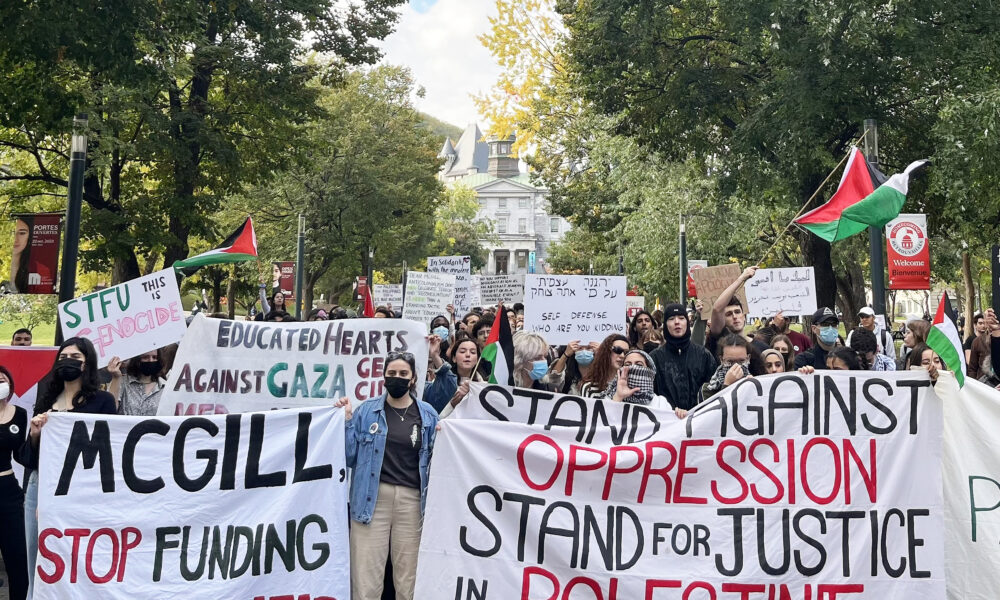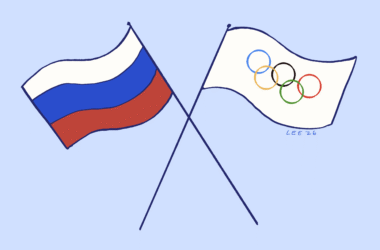Content Warning: Mentions of antisemitism, Islamophobia, violence, rape and death
On Nov. 9, I spoke on behalf of McGill’s pro-Palestine Jewish students at a rally organized by SPHR McGill in front of the Arts Building. Within hours, I received anonymous threats that included my full name, which I had never shared publicly. This slew of hateful and disturbing messages included “Isaiah supports the r*pe and murder of Jews” and far worse. These words attacking me as a “self-hating Jew” left me fearful of what the in-person consequences could be. In an encounter with several members of on-campus Jewish groups, one pro-Israel student said to me “remember that we know who you are.”
When it comes to feeling unsafe at McGill over pro-Palestine activism, I am in no way exceptional. For years, students have faced threats, verbal and physical harassment, doxxing, and blacklisting for speaking in support of Palestinian human rights. Yet, rather than responding to these students’ activism and demands, McGill capitalizes on individual students’ experiences of harassment to detract from a much more significant issue: We are currently witnessing a genocide, and our university is complicit.
As of Dec. 4, Israel has killed more than 15,500 people in Gaza according to the Associated Press, and destroyed nearly half of the homes in the region, bombing hospitals, churches, mosques, and schools. Claiming “self-defence” as a response to the Oct. 7 Hamas attacks places this violence in a vacuum. It disregards the forced resettlement and murder of thousands of Palestinians during Israel’s founding in 1948 and the continued settlement and occupation that many major human rights organizations such as Amnesty International designate as apartheid. Pro-Israel activists perpetually weaponize the trauma of the Holocaust to justify unchecked violence against Palestinians, manipulating the growing threat of worldwide, supremacist antisemitism to further Zionist aims––all with continued financial and ideological support from Canadian institutions.
In the face of such unprecedented violence, Principal and Vice-Chancellor Deep Saini and the McGill administration claim that the university’s mandate prevents them from addressing “geopolitical crises.” McGill’s refusal to stand against this obvious affront to human rights is both unconscionable and deeply dishonest, as the university’s endowment includes more than $20 million invested in companies that provide arms and surveillance equipment to Israel and financial support to the violent settlement of the West Bank.
The McGill administration chooses to focus on “antisemitism and Islamophobia” on campus, framing both activism and harassment as motivated by hate and religious bigotry, rather than as responses to an urgent humanitarian crisis. Stated measures to combat antisemitism and Islamophobia on campus perpetuate both the antisemitic notion that Judaism is intrinsically connected to the actions of the Israeli state and the racist generalization of Arab communities as singularly Muslim and intolerant to other religions. Furthermore, when the administration misconstrues pro-Palestine activism as antisemitic and falsely projects claims of violence onto peaceful student rallies, they encourage the very “tensions” they condemn.
The fixation on local experiences exacerbates a fear for personal safety, purposefully shifting attention from Gazans’ immediate danger to largely unfounded threats of violence in North America. This portrayal directly foments the harassment and intimidation that we see at McGill and other college campuses and has encouraged senseless violence in Canada and the United States. In Burlington, Vermont last weekend, three 20-year-old Palestinian college students were shot while walking down the street wearing keffiyehs. This week, one of the victims bravely reminded those concerned for him that his suffering is part of a much larger story of Palestinian oppression and resistance.
By now, I am well acquainted with the risks that I, along with many other activists both at McGill and elsewhere, face in our criticism of Israel and our support for the victims of its violence. However, I am also aware that the threats we face pale in comparison to the genocide Israel is perpetrating against Palestinians; their voices and suffering must be the focal point of any activism fighting against the state of Israel.
Yet, as student safety continues to permeate conversations regarding Israel and Palestine in North America, students cannot expect to feel fully protected while attending an institution that actively funds violence around the world. The reality of activism is that it makes people feel unsafe as it functions with the very goal of threatening the comfort of the status quo. McGill must understand that in a moment where the Israeli government threatens to “eras[e] the Gaza Strip from the face of the earth,” we must be uncomfortable. McGill can try to shut down campus activism and willfully ignore its complicity in Israeli violence, but our university community strongly, clearly, and overwhelmingly stands with the liberation of Palestine.








